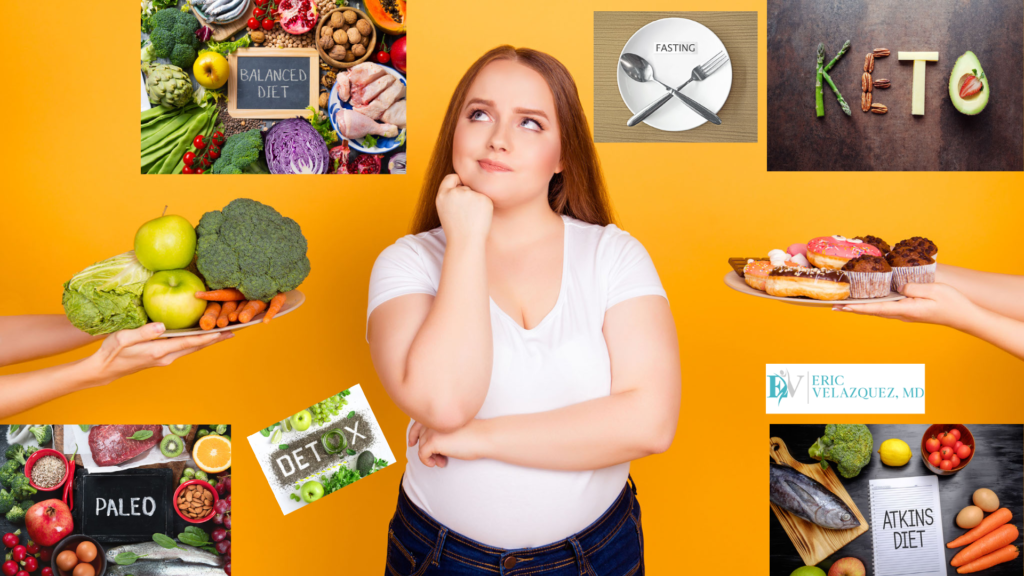In the world of health and fitness, dieting has always been a hot topic. Every year, new trends appear — from keto to paleo, intermittent fasting to juice cleanses. These so-called fad diets promise quick results but rarely lead to lasting health.
On the other hand, a balanced diet is not a trend — it’s a lifestyle backed by decades of science. In 2025, with so much misinformation online, it has become more important than ever to separate facts from fads. Let’s explore what actually works for long-term health, energy, and weight management.

1. What is a Balanced Diet?
A balanced diet means giving your body the right mix of nutrients in the right proportions. It includes:
- Carbohydrates (45–55%) → Whole grains, oats, fruits, vegetables for steady energy.
- Proteins (20–30%) → Lean meat, fish, eggs, legumes, nuts for muscle repair.
- Fats (20–30%) → Healthy fats from olive oil, avocado, nuts, seeds for brain health.
- Vitamins & Minerals → From fresh vegetables, fruits, and natural foods.
- Hydration → Water and natural fluids to keep metabolism active.
👉 The goal: nourish, not restrict.
2. What Are Fad Diets?
Fad diets are short-term eating plans that gain popularity quickly but often lack scientific backing. Examples include:
- Juice Cleanses → Drinking only juices for “detox.”
- Extreme Low-Carb (like Keto variations) → Cutting out carbs almost entirely.
- Single-Food Diets → Only bananas, cabbage soup, or one type of food.
- Detox Teas or Pills → Marketed as fat burners.
They may give quick weight loss results initially, but most are unsustainable and may harm your body long term.
3. Why Fad Diets Fail
- Unsustainable: People can’t stick to extreme restrictions.
- Nutrient Deficiency: Cutting out entire food groups leads to weakness.
- Slowed Metabolism: Extreme calorie reduction signals the body to store fat.
- Yo-Yo Effect: Weight comes back once the diet stops.
- Mental Stress: Strict diets create guilt and obsession with food.
In 2025, with AI-driven fitness apps tracking health data, it’s clearer than ever that fad diets are temporary fixes, not permanent solutions.
4. Benefits of a Balanced Diet
- Steady Energy: No more sugar crashes or fatigue.
- Stronger Immunity: Nutrients keep your defense system strong.
- Better Weight Management: Healthy eating regulates metabolism naturally.
- Improved Mental Health: Proper nutrition boosts mood and reduces anxiety.
- Long-Term Disease Prevention: Balanced eating lowers risk of diabetes, heart disease, and obesity.
👉 Instead of extremes, balance creates sustainable health.
5. 7 Practical Tips for Eating Balanced in 2025
1. Follow the 80/20 Rule
Eat nutritious foods 80% of the time, and allow 20% for enjoyment. Balance, not perfection.
2. Eat Whole, Not Processed
Choose natural foods — vegetables, fruits, grains, lean protein — over processed fast food.
3. Portion Control
Don’t just focus on what you eat, but how much you eat. Smaller plates help control overeating.
4. Prioritize Protein
Protein builds muscles, boosts metabolism, and keeps you full longer. Include it in every meal.
5. Stay Hydrated
Dehydration is often mistaken for hunger. Drink 2–3 liters of water daily.
6. Plan Your Meals
Meal prepping saves time and keeps you away from unhealthy last-minute food choices.
7. Be Mindful, Not Obsessive
Enjoy your food. Eat slowly. Listen to hunger and fullness cues.
6. The Future of Dieting in 2025
- AI & Wearables → Personalized meal plans based on body data.
- Genetic Testing → Diets designed according to your DNA.
- Sustainable Eating → Focus on eco-friendly, plant-rich diets.
- Mindful Eating Apps → Technology that trains better eating habits.
Instead of following extreme trends, the future of dieting is personalized balance.
🌟 Final Thoughts
Fad diets may look attractive, but they are quicksand — the more you rely on them, the deeper you fall. A balanced diet, on the other hand, builds strength, immunity, and energy for life.
Remember: Health is not about being perfect — it’s about being consistent.
